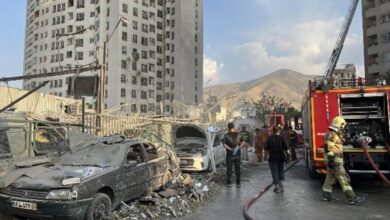Summit of the Americas: Consequences of AMLO’s Boycott of Biden
The Mexican president is blunt in conditioning his assistance to the invitation of Venezuela, Cuba and Nicaragua, a fact that has generated uncertainty. What does AMLO's possible absence leave at the Summit of the Americas? .

Photo: TW-NicolasMaduro
LatinAmerican Post | Luis Angel Hernández Liborio
Listen to this article
Leer en español: Cumbre de las Américas: Consecuencias del Boicot de AMLO a Biden
The IX Summit of the Americas is about to begin and uncertainty reigns in the atmosphere. The omission of one or more countries is not a novelty, however the context of this occasion and the possible consequences are remarkably striking. Especially noteworthy is the position of Mexico, until four years ago a traditional ally of US policy in Latin America, who, in the voice of its president, Andrés Manuel López Obrador, has set an ultimatum at his conference on May 27: either Cuba is invited , Venezuela and Nicaragua or the summit is held without their presence.
Cuba: The Eternal Discussion
With each new summit the eternal discussion about Cuba's participation returned to the table, the ideological ups and downs of Latin American politics during the 21st century have created all kinds of positions regarding the case of the island. Finally, Cuba attended the summit held in Panama in 2015 with the presence of Raúl Castro, the Panamanian government gave in to the protests of various countries and invited the Caribbean country , the context was perfect with Obama in the US presidency who did not oppose the Cuban presence and that even resulted in an advance in their relations. In 2018, Cuba attended the summit held in Lima, although on this occasion it was represented by Foreign Minister Bruno Rodríguez, at a summit in which the President of the United States, Donald Trump, did not attend.
In 2022 the discussion about the invitation to Cuba has returned to the table, with the addition of Venezuela and Nicaragua. As the host country, the United States has the power to decide which countries to invite and which not. Its diplomatic tradition based (ambiguously) on the defense of democracy has left the three countries uninvited, at a summit that gave Joe Biden the opportunity to regain diplomatic ground in the region. The resistance has not been long in coming, in a Latin America almost totally oriented to the left, the refusal to invite Cuba, Venezuela and Nicaragua has generated reactions against it on the part of Argentina, Chile, CARICOM countries, Guatemala, the Dominican Republic, Bolivia , Honduras and Mexico. The tension has reached the point that the president of Mexico has declared that if Cubans, Venezuelans and Nicaraguans are not invited, then the summit will not have their presence, an action that CARICOM countries, Guatemala, Bolivia and Honduras have supported. Jair Bolsonaro will also attend with a critical position towards Biden but for breaking the "good economic relationship" that Brazil had with Trump.
The diplomatic tradition of Mexico, in search of balance
Is it a boycott? The summit could take on these dimensions if the absence of Mexico and the countries that support it materializes, the position of the United States is complicated, on the one hand they are in an election year in which the counterweights in the legislative power can be modified in against the Biden government. There is also the tension due to the invasion of Ukraine and the commercial rivalry with China, to which can be added the abandonment and even the aggressive policy that Trump had towards Latin America and that Biden has not tried to repair in depth. Possibly the most critical point for the United States is Mexico, its main trading partner , which during the 21st century has supported almost all US initiatives towards Latin America, however, the change brought about by the López Obrador government has created an imbalance that complicates the relationship between both countries.
Mexico's diplomatic tradition has been based since 1930 on the so-called Estrada Doctrine , which emphasizes that the legitimacy of a government should not depend on the recognition of others as is traditionally done in international relations even in the XXI century. Through this doctrine, Mexican diplomacy kept its distance from the political problems that implied regime and government changes in Latin America and the world. Thus, the doctrine is based on non-intervention, a principle that López Obrador has manifested in his actions towards the countries designated as non-democratic in the region and of whom he has shown himself an ally. This position worked for AMLO during the Trump administration to maintain a stable relationship, a balance that seems to be blurred with the arrival of Biden. For the opposition in Mexico, AMLO's position is simply a political ruse to support the three countries without having to confront the United States.
You can also read: Maduro announces another economic war: De-dollarize Venezuela
Is America's leadership in jeopardy?
The absence of López Obrador and his allies could go unnoticed or could turn into a catastrophe for the United States, in a summit that has looked increasingly soulless. Receiving the snub from the second largest economy in Latin America, its main trading partner and which is directly or indirectly supported by the most important countries in the region, could seem like a sign of weakness, which could deepen if the left recovers Brazil and if it arrives for the first time at the government in Colombia. Could the United States continue to refuse to exclude Cuba, Venezuela and Nicaragua in the medium term? At the moment it seems not. The United States must rethink its role in the continent, López Obrador's position seems to push the power to reflect. For Mexico it will not be free, the United States will not forget the episode and will charge it to its neighbor with whom it has common goals in matters of security, migration, economy and in which there are presidential elections in 2024 crucial for the continuity or defeat of the left. For López Obrador, the reflection will revolve around whether he could have taken an attitude similar to that of Argentina and Chile, who will attend the summit with a clear protest for the exclusion of Venezuela, Cuba and Nicaragua, a more conciliatory position.





